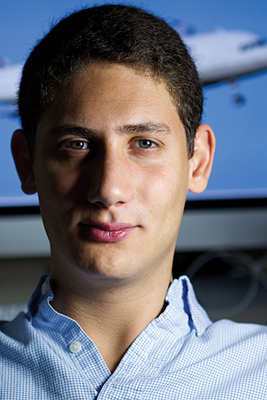By Adam Gerchick ’13
“You sound terrible,” my friend Josh advised me, smirking.
“Thass,” I whispered.
“I mean, you sound really, really bad.”

Major: American Studies
Member: Association of Amherst Students
My voice was shot, a casualty of the mounting desperation that defined the final weeks of my effort to write the first chapter of my senior thesis before the end of fall semester. After months of exploring, free-associating, questioning, envisioning, researching, discussing, plotting, outlining, introducing and stretching, I had exhausted all viable means of avoiding.
I’d decided last summer to write my American studies thesis on some aspect of the relationship between political rhetoric and American ideology. By September, I’d reached the babbling phase, able to explain my focus in broad vagaries until my listener grasped my argument or gave up trying. This tactic proved successful until I was assigned my thesis adviser.
“I think we’ve talked enough,” Professor Jeffrey Ferguson suggested softly on our third meeting. He requested a short thesis statement, which forced me to refine my topic: I’d study the increasingly effective means campaigns employ to identify and persuade potential voters. (Spoiler alert: These innovations, I concluded, will not likely aid the health of American democracy.)
I spent the next two months acquiring a small expertise in the production of Lyndon Johnson’s infamous, and effective, “Daisy” ad of 1964 and the subtle power of Ronald Reagan’s 1984 “Morning in America” series. For a while, I felt ahead of the game.
Then my adviser emailed me in late November to ask how much of that first chapter I’d written. “At the moment, I still need to prepare the introduction to the chapter, its concluding analysis, and the full integration of my writing into a fluid narrative,” I replied, a line I’d later appreciate as a masterwork of downplay so effective that it even convinced me and, if nothing else, demonstrated my understanding of political PR.
And so began my “round-the-world tour”: a two-week period during which my body clock cycled through every time zone on earth. Each day I stayed up outlining, re-researching and writing until I succumbed to a nap, waking several hours later to beg a neighbor for a Pop-Tart and repeat the process. I was desperate to ward off the procrastination that might set in with a full sleep. This was a bad idea, but it earned me an extraordinary beard.
I submitted my chapter on Dec. 16, reviewing it in a daze before hitting “send” and falling asleep.
Weeks later, trudging through Chicago O’Hare en route to Washington, D.C., I noticed a familiar cable-TV face at a boarding gate. I pleaded with an agent to switch me to this man’s earlier D.C.-bound flight, and—this is bad—explained to another agent that I was traveling with David Axelrod and might we be seated together?
The senior architect of both Obama presidential campaigns proved kind and engaging, casually affirming my most revelational thesis arguments as obvious.
Back home, I took stock of my progress. Sure, there was analysis, integration and writing to be done, but those steps were practically formalities. I’d landed a major interview. How could my second chapter not be a cakewalk?